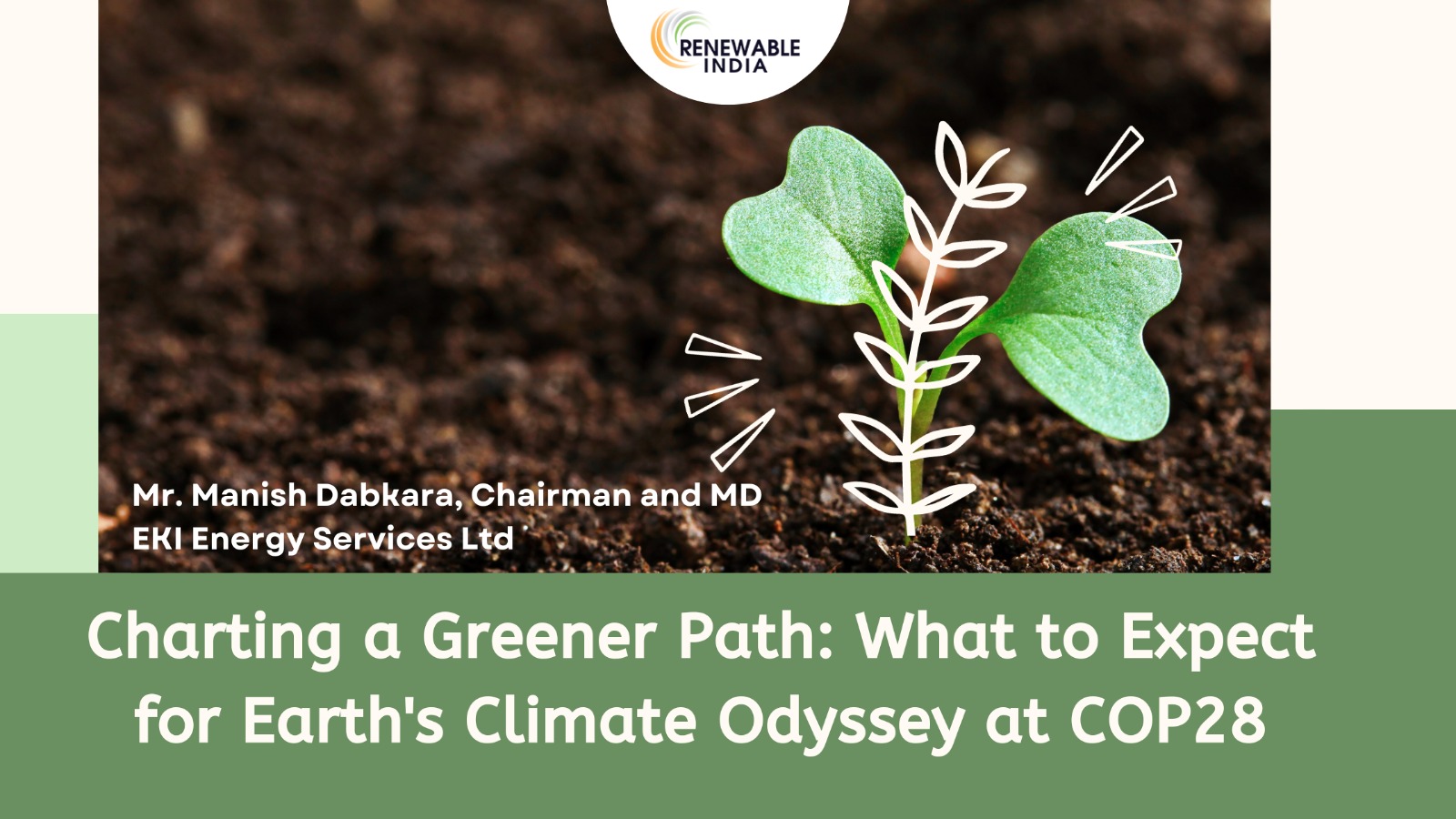
In the last week of November, representatives from nearly 200 nations will gather in Dubai for the 28th edition of the United Nations Conference of Parties (COP28), a pivotal event aimed at coordinating global climate action for the upcoming year. Running from November 30 to December 12, 2023, in the United Arab Emirates (UAE), the United Nations Climate Change Conference is set to make some crucial decisions.

This article is written by Mr. Manish Dabkara, chairman and MD EKI Energy Services Ltd.
Setting the tone for the upcoming global climate event, Sultan Al-Jaber, President of COP 28, has requested its 198 member countries to develop plans to reduce greenhouse gas emissions by 22 gigatonnes over the next seven years in order to limit global warming to 1.5 degrees Celsius above pre-industrial levels. The Paris Agreement initially called for keeping global temperature increases “well below 2°C” above pre-industrial levels, with efforts to limit it to 1.5°C. At COP26 in 2021, the focus shifted towards the more ambitious 1.5°C goal due to the alarming scientific evidence indicating the catastrophic consequences of a 2°C rise since 2015.
One of the highlights of COP28 will be a “global stocktake,” a first of its kind, where governments will assess the progress made in achieving their Nationally Determined Contributions (NDCs), which they committed to in the Paris Agreement to reduce emissions.
Despite these efforts, it’s clear that achieving the 1.5°C target remains a daunting challenge. At the current rate, the world is on track to exhaust its carbon emissions budget by as early as 2030. This reality may necessitate a shift in focus towards the 2°C goal.
So, what can we expect from this highly anticipated event, and what are the key issues at hand?
Climate finance, essential for combating climate change, refers to the financial resources and mechanisms required for transitioning to a low-carbon global economy and supporting communities in adapting to the impacts of climate change. Developed nations, historically major contributors to climate change, pledged to provide $100 billion annually to assist climate action in low-income countries.
However, the progress in meeting this commitment has been lackluster, casting doubt on enhanced financing for loss and damage in economically underdeveloped nations, as well as adaptation and mitigation measures in rapidly developing economies. COP28 needs to ensure that this long-delayed target, originally set for 2020, is finally achieved. The effects of climate change are already wreaking havoc on developing nations, which often lack the financial resources to transition to low-carbon economies.
At COP28, governments will undertake a “global stocktake” for the first time, assessing each nation’s progress in achieving their NDCs. While the world is falling short of its Paris goals, the COP presidency has opted not to single out specific nations for criticism. Instead, all nations are expected to submit more stringent NDCs by September, creating a collective inventory of global climate action and identifying gaps.
The ideal outcome of this stocktake is a course correction, with the global community showing a commitment to accelerating climate action and providing a roadmap for action over the next seven years, sector by sector and region by region.
During the G20 summit in Delhi, discussions on climate, energy, and sustainable development took center stage. There was anticipation that the G20 might agree to phase down all fossil fuels, including coal, oil, and gas, within a specific timeframe. However, the final declaration primarily emphasized the transition to low-emission energy systems and the scaling up of clean power generation, with no specific mention of phasing down oil and gas.
This omission has sparked debates about the moral responsibility of countries like the UAE, which hosts COP28 and has high per capita emissions, to advocate for a broader phase-down commitment.
The declaration highlights the responsibility of developed nations for emissions reduction, but progress has been slow. To address this, a consensus on responsibility frameworks may require outcomes from the Global Stocktake (GST), which assesses global progress toward climate goals.
The G20 has suggested ways to finance low-emission system transformation, advocating for the involvement of multilateral development banks. Additionally, there’s a global target to triple renewable energy capacity and double energy efficiency. Carbon capture and storage are also discussed, though the progress is slow. Emotive issues like funds for loss and damage and adaptation financing will vie for attention at COP28, highlighting the need to balance immediate concerns with future transition goals.
While the overarching goal of these gatherings is global collaboration in the fight against climate change, the specific themes can evolve from year to year. Al Jaber, has outlined four critical pillars for COP28: fast-tracking the transition to a low-carbon society, addressing climate finance challenges, prioritizing people’s well-being and livelihoods, and promoting inclusivity.
Our only chance to maintain a safe climate for future generations is through coordinated global action. We must urge countries to make more ambitious commitments at COP28 and support them in fulfilling these promises. The importance of COP28 cannot be overstated—it’s a pivotal moment in the global effort to combat climate change. The global stocktake offers nations an opportunity to reevaluate and strengthen their climate commitments, with the hope that it leads to a unified global response that identifies gaps and charts a roadmap for swift, effective action. This action plan must encompass the transition to low-carbon societies, addressing climate finance shortcomings, prioritizing people’s well-being and livelihoods, and ensuring inclusivity.
The article is written by of Mr. Manish Dabkara, chairman and MD EKI Energy Services Ltd
Leafy Organic Straws – A Sustainable Revolution for a Greener World
Leave a Reply